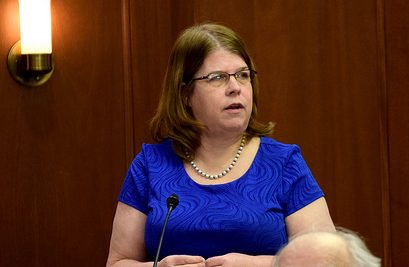



READ: Indian Child Welfare Court in Duluth aims for better outcomes for Native American families | Duluth News Tribune
That’s because they have federal protections under the Indian Child Welfare Act.
Wilson said she thinks all Alaskan families should have more the more stringent protections required by ICWA, with family members such as grandparents having to be consulted before a child is fostered or adopted outside of the family.
Native Americans expect nothing good from Trump...read more at blog https://t.co/PPShGrS0pp pic.twitter.com/yzNMOSp8XB— http:LaraTraceHentz (@Trace15) January 27, 2017
America First? How About First Americans First? - Native News Online https://t.co/KmmRpsINq7— http:LaraTraceHentz (@Trace15) January 29, 2017

Yankton Sioux Tribe Chairman Asks President Trump to Release All Correspondence Relating to… https://t.co/DuJBblybAS pic.twitter.com/GeSWZ5HyER— NativeNewsOnline (@Native_NewsNet) January 27, 2017

Published January 29, 2017
WASHINGTON — Longtime activist Winona LaDuke says the actions to ignore the wishes of water protectors at Standing Rock in North Dakota seek to dehumanize American Indians.
The American Psychological Association weighed in this past week after President Trump’s issuance of a presidential memorandum regarding construction of the Dakota Access Pipeline with this statement:
“The American Psychological Association is concerned by President Trump’s apparent attempt to clear the way for the Dakota Access Pipeline to move forward as originally planned, which threatens the welfare of the Standing Rock Sioux Tribe.
“Native Americans have been historically marginalized and mistreated by the United States. Research has linked historical trauma to health disparities, including increased likelihood of early death due to substance abuse, unintentional injuries, assault, homicide and suicide.
“APA urges the Army Corps of Engineers to continue to search for alternative routes for the oil pipeline that do not endanger the water supply, sacred burial grounds and treaty rights of the Standing Rock Sioux. It is critical for the corps to consult with the tribe in this process, as stipulated in the December 16 memorandum by the assistant secretary of the Army for civil works that halted construction on the pipeline project pending further review.
“This pipeline affects not only Native American citizens but millions of American citizens downstream, who are at risk of suffering the effects of possible exposure to toxic oil spills and dealing with harm to the environment.
“Given our skills as psychologists, we stand ready to participate in constructive problem resolution, as well as provide support for those who were and remain in harm’s way — physically, psychologically and spiritually.
“We ask that the new administration not repeat the mistakes of the past, and that it respect the sovereignty, welfare and culture of our native peoples.”Indigenous Women Rise: Women’s March on Washington https://t.co/SLzOa0qLeV pic.twitter.com/3FnSLGH6uK— NativeNewsOnline (@Native_NewsNet) January 24, 2017
 Koppel said a similar program implemented from 2000-2010 saw a significant reduction in the percentage of black children placed into foster care.
Koppel said a similar program implemented from 2000-2010 saw a significant reduction in the percentage of black children placed into foster care.This is part of adoption a lot of people don’t talk about. It’s one of the reason adoptees commit suicide. It’s one of the reason there’s a disproportionate number of adoptees seeking mental health care. When blood relatives turn their backs on adoptees, the effects are devastating, and yet many adoptees do what I did, which is to shrug it off. I didn’t want to meet her/him anyway. I already have brothers/sisters. I don’t need more.

”It’s almost as if you’re saying that ICWA isn’t really needed anymore because the playing field is level, which unfortunately is still not the case in Alaska, or in many other parts of the country,” Lawton said.
"My aspect is if we weren’t taking children that we should not be taking, we would be able to use the resources into families that really do need those resources,” Wilson said. “Cause, it’s much cheaper and it’s better for the family to be able to keep the children in the home. And then if you need the parents to do certain types of classes, then you have those worked out at the same time”
 UPDATE Submitted by mbowen on 01/20/2017
UPDATE Submitted by mbowen on 01/20/2017 “In those days, if you were Native American, you had to be careful of the Mormon Church. Back then, the Mormons would take Indian babies, cut their hair and turn them into servants. In fact, they made a lot of money doing that until the Indian Child Welfare Act of 1972 put an end to it. It was very common for kids of a family to live with an aunt for six months or a year. Well, as soon as this would happen, the Mormon Church would come in and say this woman has abandoned her family. They would come in and cut their hair, not allow them to speak their native language anymore and, basically, sell them. It was a bit like slave trade. It was amazing they got away with it as long as they did.”READ THIS STORY
Podcast with Aboriginal CKCU Duane Morrisseau-Beck National Indigenous Survivors of Child Welfare Networkby Indigenous Adoptees |


Congress enacted IWCA to address the separation of Indian children from their families at a disproportionately high rate, as a result of state agency policies and practices that placed the children in non-Indian foster and adoptive homes.


Andrew Balfour, a Cree composer and a ’ 60s Scoop survivor , has spent nearly two decades developing the ideas behind Polyphony Meets the Pr...
